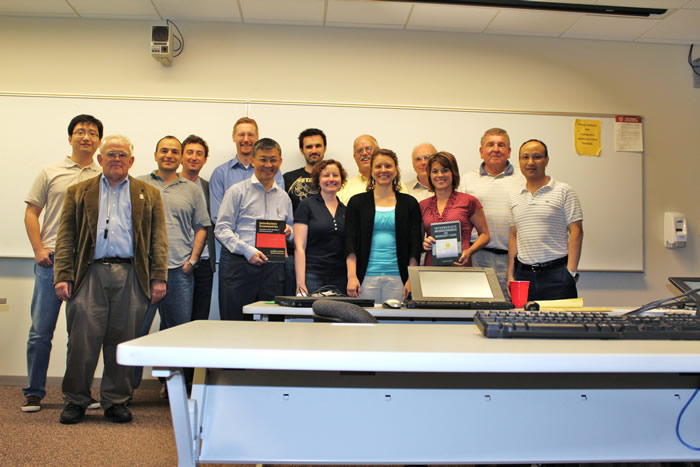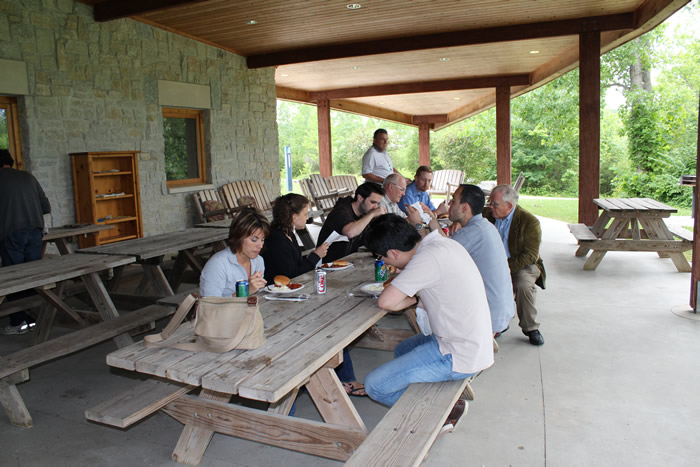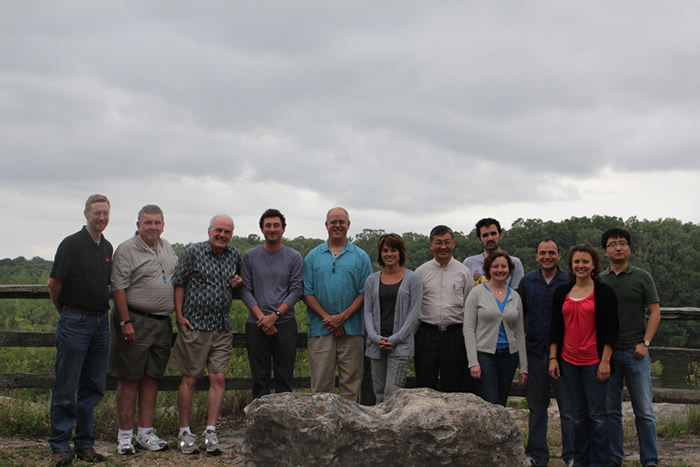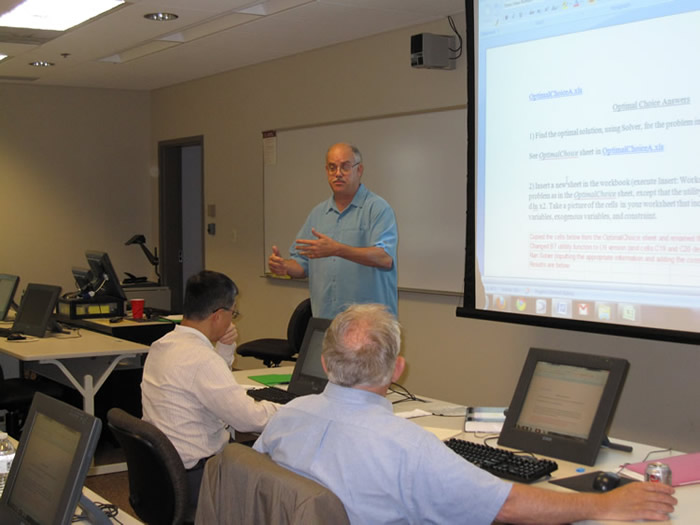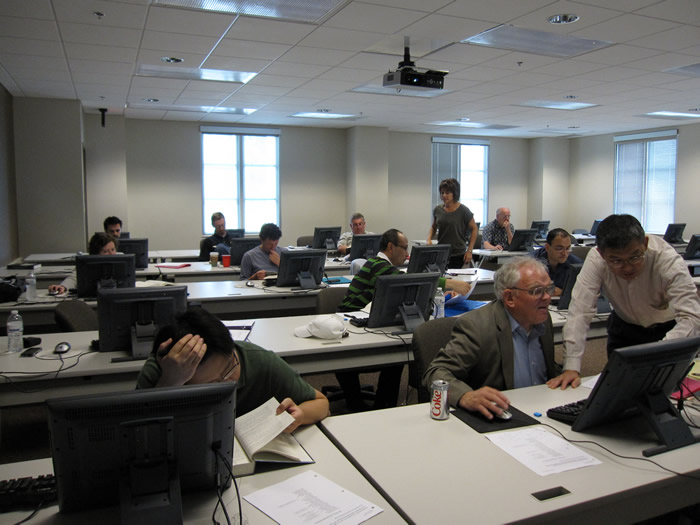2011 Workshop: Teaching Economics with Excel
This workshop was held from June 22 - 24, 2011. The original description and schedule are below, after a few comments from participants and photos.
Participants
| Sean | Brocklebank | University of Edinburgh |
| Salvador | Contreras | University of Texas -- Pan American |
| Rob | Dunn | Washington and Jefferson |
| Lauren | Feiler | Carleton |
| Tiffani | Gottschall | Washington and Jefferson |
| Jennifer | Grant | Haverford |
| Timothy | Hau | University of Hong Kong |
| Jerry | Heavey | Lafayette |
| Adam | Jones | UNC-Wilmington |
| Zuohong | Pan | Western Connecticut State |
| Guangjun | Qu | DePauw |
| Steve | Robinson | UNC-Wilmington |
| Robert | Rogers | Ashland |
Comments and Feedback Quoted from Evaluations
"I am a seasoned, well-read economist and this has been the best learning experience in my career."
"This workshop opened a research door for me. . . . I would have never known about the many ways I could manipulate data in Excel. . . . It is amazing."
"I really got a lot out of this workshop. I was worried that it would be very focused on the intermediate level, which I don't teach, but I'm coming away with a lot of ideas for my courses (principles and others!). The content was great and everything else was fun. Thanks!"
"This was a great workshop. . . . It's hard to find 'extras' like this for Intermediate Micro materials and this is it!"
"Overall delivery was great -- relaxed atmosphere and exciting presentations. . . . Coverage and content were impressive -- LOTS of material at a fast pace. . . . Overall, thanks for a great 3 days of learning!!!"
"I don't teach econometrics, but this made me wish I did. It really helped to visualize the process of simulation."
"Terrific tools for manipualting models and terrific modules. I expect to make good use of them this year. . . . . Keep up the good work. This was very well organized, interesting and lively. . . . I will recommend it to my colleagues and my recommendations will be accompanied by some demonstrations of what we've done. Thank you. This has been GREAT."
"Really enjoyed this workshop. Content is well-thought out, organized, and delivered. Awesome communication/projection in delivery. I know this workshop will significantly improve my teaching. Thank you."
"The Comparative Statics Wizard was the best part of the class for me. I can see this being very valuable for students."
"Simply excellent. This will benefit not only my teaching, but also my own research in the future."
"I really enjoyed your presentation [of Monte Carlo simulation] and how you motivate the topic."
"Most useful material for teaching Intermediate Microeconomics. Just as advertised."
"Great materials. . . . I wish we had more time together."
"I never knew you could do (X'X)-1X'y in Excel! . . . The workshop really was excellent. Thank you so much for putting it on. You've done great work."
"You're a great presenter to listen to and kept everything interesting. I'm excited to take this content back to our Econ faculty and share it with them."
Photos
These photos were taken by Zuohong:
These were taken by Jennifer:
Workshop: Teaching Economics with Excel
June 21 - 24, 2011
DePauw University, Greencastle, Indiana
Description
While the content of the typical undergraduate Intermediate Microeconomics course has remained stable in recent decades, computers have become more powerful, easier to use, and as common as pencil and paper. In spite of these developments, teaching methods remain virtually unchanged, with chalk and talk the dominant mode of delivery. This workshop will demonstrate how to utilize computer-based, active learning techniques to teach economics, focusing especially on Intermediate Micro. By providing real, concrete examples with clear visual feedback, students learn much more economics and acquire sophisticated computer skills.
We will begin with an Excel version of Maddison’s World Economy data, which enables interesting cross-sectional and longitudinal comparisons of countries, and then examine a set of 14 Excel-based labs for Introductory Economics. Focus then shifts to the main pedagogical theme of the workshop: using numerical methods to complement conventional, analytical approaches enables much deeper comprehension. Excel’s optimization add-in, Solver, is introduced, followed by the Comparative Statics Wizard. The second day uses Barreto’s Intermediate Microeconomics with Microsoft Excel (Cambridge University Press, 2009) to demonstrate a series of Excel workbooks covering the Theory of Consumer Behavior and the Theory of the Firm. The third day covers partial equilibrium supply and demand analysis, and general equilibrium. Participants will have time to explore chapters of interest and practice teaching with the Excel files.
Workshop sessions will be held in a computer lab in DePauw’s Julian Science Center. Participants will learn how to teach with macro-enhanced Excel files in a projection display lecture style and in computer lab environments. A traditional course can be spiced up by occasional use of Excel-based content as examples or homework assignments. This professional development will enable participants to create new course materials and content. Individual lectures, lab components, or entire courses can be reworked and enhanced.
In addition to Barreto’s Intermediate Microeconomics with Microsoft Excel text and files, participants will receive a set of Excel-based computer labs for Introductory Economics along with add-ins for simulation and econometric analyses in Excel.
Dr. Barreto is interested in using computers (especially Microsoft Excel) to improve the teaching and learning of economics. He is the Elizabeth P. Allen Distinguished University Professor at DePauw University and author, with Frank M. Howland, of Introductory Econometrics using Monte Carlo Simulation with Microsoft Excel (Cambridge University Press, 2006).He has been a Fulbright Scholar, won several teaching awards, and has presented the materials used in this workshop at many colleges and universities around the world.
There is no fee to attend the workshop and all meals and lodging are provided by the generous support of the Elizabeth P. Allen funds at DePauw University. Participants are responsible solely for transportation costs. Space is limited.
Schedule
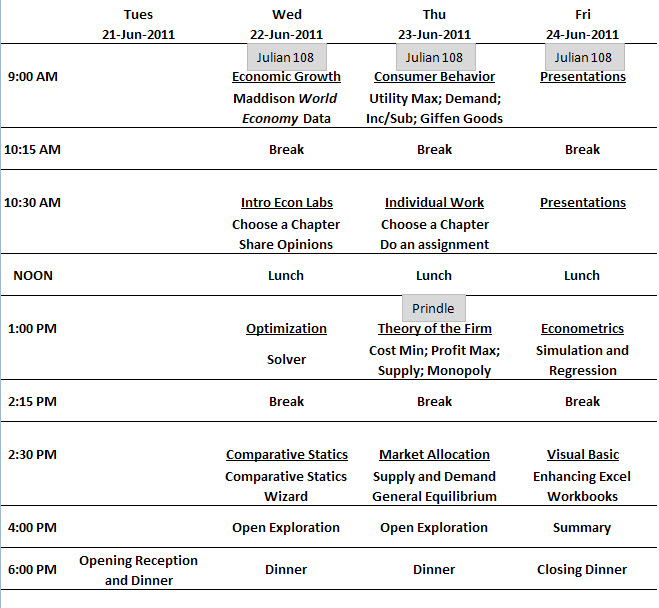
Express Interest
Email hbarreto@depauw.edu if you have questions or would like further information. Participants will accepted on a first-come-first-served basis. Please contact me if you are interested.
